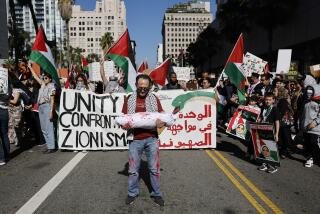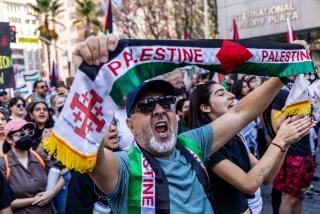Bishop Brom Urges Congress to Avoid War With Iraq
- Share via
Bishop Robert H. Brom, leader of the Roman Catholic Diocese of San Diego, urged Congress on Monday to avoid using military force against Iraq, saying the United States must “seek a peaceful resolution of the crisis and pursue legitimate objectives by nonviolent diplomatic means.”
In a prepared statement read during a rally at the University of San Diego, Brom condemned Iraq’s takeover of Kuwait, but stressed that the invaded country’s biggest hope for peaceful liberation is through internationally applied sanctions.
He also said that any actions taken against Iraq should not deprive civilians of food and medicine.
Brom’s statements, read by diocese spokeswoman Jeanne Ertle, were based on ones made during last month’s national meeting of bishops in Washington. The National Council of Catholic Bishops became one of the first major U.S. organizations to challenge the Bush Administration’s policy in the Persian Gulf.
Brom was not able to attend the rally because of the short notice, Ertle said.
Monday’s rally drew more than 150 students, who gathered in front of Hahn University Center in bright sunlight to listen to speakers talk about the gulf crisis. Student volunteers collected signatures for a petition as part of a statewide effort on university campuses to urge Congress and Bush to avoid war with Iraq.
The signatures will be combined with those from similar rallies at UC San Diego, San Diego State University and Grossmont College, and will be presented to local members of Congress by New Year’s, said rally organizer Robert Simmons, who teaches law at USD.
“If war comes,” Simmons said during the rally, “and the body bags start coming home, you and I will never forgive ourselves for the rest of our lives unless we do everything in our power now to prevent this war from occurring.”
Student speaker Anna Barhum warned that the United States should look at future relationships with countries in the Middle East rather than exploiting them for their natural resources. She said there are many options in the Persian Gulf crisis that have not been fully explored, such as letting the countries involved work out a solution for themselves.
“We have to decide on our foreign policies and what image we want to present,” she said. “We are perceived as being the bully. Saddam Hussein is seen as a hero just for standing up to us.”
Vietnam veteran Terry Hertzler warned students that, if there is a war, chances are they will be fighting it.
“War is sometimes inevitable,” he said, “but I think it has to be the absolute, final option we can choose, because of what it does to all of us. . . . Wars aren’t pretty.”
Hertzler visits college campuses each semester to teach students about the Vietnam War. He said today’s students in some ways are more sophisticated than he was at age 18, but in other ways are much more naive.
“To many students, the Vietnam War may as well be the Crimean War,” he said. “It’s ancient history in many ways. The students are very interested, but there’s not a lot of knowledge out there. “
More to Read
Sign up for Essential California
The most important California stories and recommendations in your inbox every morning.
You may occasionally receive promotional content from the Los Angeles Times.













